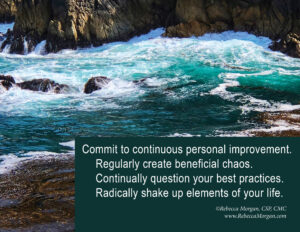
People I admire strive to become better as a partner, parent, child, friend, boss, coworker or human being. They are continually looking for ways to improve, whether for their relationships, or to create more effective habits for themselves.
I’ve noticed three ways these people improve themselves.
1. Regularly create beneficial chaos.
Beneficial chaos is when you purposefully destroy something to rebuild it for the better. Changing jobs can be chaotic at first, but you do so to grow professionally. Remodling your home means going through some chaos for a better result. Even small things, like reorganizing your closet means taking everything out (chaos) to throw out items and organize the remaining ones.
When you intentionally create a big change, you know it will require some patience and uncomfortableness before experiencing the benefit. If you aren’t willing to go through this, you will always wonder how life would have been better if you had made the shift.
What have you been wanting to do that you haven’t because you’re concerned about the chaos it would create? Write down the specific disarray the action might cause and who would be affected. In partnership with them (ideally), map out how you could mitigate the upheaval so it’s bearable. Estimate the duration of each stage so you know how long you’ll have to muddle through.
A few years ago I remodeled my kitchen, one of my bathrooms and a guest room. I work from home so knew I’d have to work around the sawing, hammering and dust. I arranged the remodel for the summer so I could move my kitchen and work space outside in the pleasant weather. I had a full-sized refrigerator, grill, pots, pans, table and chairs. I washed dishes in my master bathroom. It was actually fun to work and cook outside for the summer. Although I crave order, I knew this was only for a few months and made the best of it.
2. Continually question your best practices.
We think about how to do something the first time then rarely question the process. We habitually accomplish tasks the same way each time: drive to work, brush our teeth, cook an egg, fold clothes, pay bills, etc.
What if we step back and regularly examine our practices? Marie Kondo causes people to think about how they store their clothing so many are now rolling or stacking items on end. Your dentist may cause you to rethink how you brush or floss your teeth. Beautiful, sunny days may inspire you to walk or ride your bike to complete errands.
I travel a lot and have modified my habits so now I pack more effectively and efficiently. I continue to experiment with new methods so my life is less stressful on the road. I’ve discovered I love to pack as it’s like a big jigsaw puzzle!
Each day or week, evaluate something you do without thinking and ask yourself if there’s a better way. You’ll be surprised by how many habits you can improve, or steps you can eliminate.
3. Radically shake up elements of your life.
Be willing to ask yourself, “What if I ….”
I asked myself, “What if I made my home office into a guest room?” “What if I converted my paper files to digital and discarded the paper?” “What if I got rid of items I haven’t used in a few years?” “What if I listed my new guest room on Airbnb?” I took action based on this series of “What if I” questions. The result has allowed me to meet some great people who stayed in my home, and gave me revenue I could contribute to the charities I support.
Friends have rented their home out for a year or more as they traveled. Some have gone back to school in their forties, fifties or sixties. Others have started businesses. Some have ended or started relationships.
Perhaps these examples are too extreme for you. “Radical” for you may mean joining an exercise class and attending regularly. Or enrolling in a course you’ve wanted to take. Or finding a more scenic way to work, even if it takes a little longer.
Only you can decide what “radical” means to you and how much shake up you can embrace.
The key to committing to continuous personal improvement is being aware of what you’re doing (or not doing) and challenging yourself to improve it. It can only make your life better.